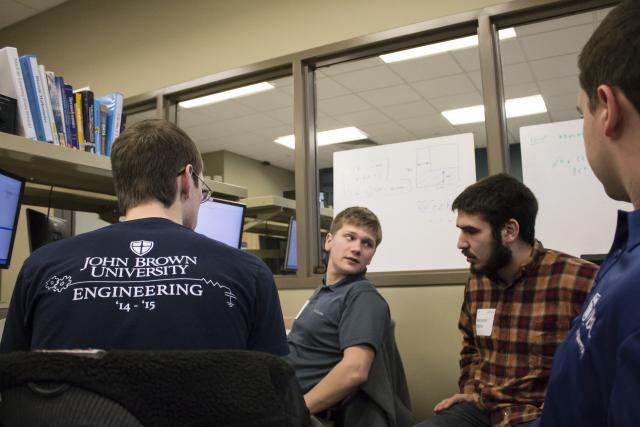![]()
Computer keyboards clicking, eyes glued to computer screens and mumbled conversations of languages such as C++ and Python are exchanged. This is the scene on Jan. 31 at John Brown University’s Third Annual Computer Programming Competition.
Although not many students would willingly spend seven hours on a Saturday solving the same seven problems on a computer screen, junior John Brown engineering student Kent McDonell disagrees.
“I think it’s really interesting and a fun opportunity,” McDonnell said.
Having no previous experience with coding, McDonell has since taken computing classes and seen its benefits.
“It’s a super useful skill and it’s really, really needed in the modern world,” McDonell said.
McDonell believes it is important for everyone to understand that, “everything is coding when it comes down to it.”
“Your phone, your lights, the microwave, the fridge, everything has a microchip in it,” McDonell said.
Currently taking an embedded systems class, McDonell expressed the knowledge that any huge development is going to take coding at some point.
Robert Norwood, dean of students and professor of engineering attended the event and stressed the importance of using code in life.
“If you can program, you can think step by step and use problem solving skills,” Norwood said.
“From something as simple as programmable thermostats to using things online, learning how computers think, can help people understand what’s going on,” Norwood said.
He added that learning programming and code as an engineering student has aided him with his other jobs.
“Although coding wasn’t necessarily what you are being paid to do, it helps you accomplish the other things you want to do,” he said.
Sophomore engineer Benjamin Morris competed in the competition and said, “To be an engineer you don’t have to be smart, you just have to want to do it.”
Working on the same problem for multiple hours, the engineers explained how they kept up their endurance and the satisfaction of getting through the rough spots.
“Starting with a problem and having no idea how to do it, and after an hour or 3 hours later, coming up with a solution that works is like ‘man I just did that,’ ” Morris said.
“We’ve pulled all-nighters, so these 7 hours are nothing,” McDonell said.
When asked how to avoid hitting a wall when solving long problems Morris said, “Taco Bell runs and doing something other than coding can clear your mind and help you continue to code.”
McDonell emphasized the importance of working in a team when you hit a wall during a problem and asking your teammates for help.
Tim Gilmour, assistant professor of engineering and construction management said, “There is more and more interest in programming and this year we were able to add Java and Python in addition to the other languages.”
Gilmour agreed that computer programming helps to solve a lot of real world problems such as transportation, energy and communication.
This year’s competition debuted participation from high schools in the surrounding area. Out of the 35 participants, 23 were AP computer science high school students from Bentonville and Fayetteville competing for $1,000 scholarships to the University.
Placing second to John Brown, Bentonville High School team members of encoders, Sabrina Shepherd, Jacob Loukota and Teagan Shepherd were each awarded a $1,000 scholarship.
In third place were Fayetteville High School students Sarah Bondurant, Brayan Herrera and Brian Dearing for team “Briyan” were awarded $500 scholarships each.
And three-time John Brown University winner Zachary Lee and teammates Kyle Crouse, Ernesto Lopez Chan and Israel Hernandez were each awarded $20.





